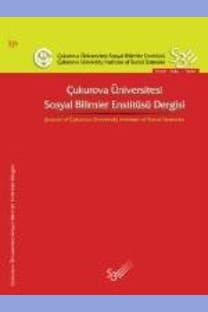Beliefs About Language Learning: Gender Related Or Not?
Öz
This study aimed at determining if there was a statistically significant difference between the male and female university prep class students‟ beliefs about language learning. The subjects participated in the study were 180 (90 male and 90 female) university prep class students from Foreign Language Education Center (YADYO) at Cukurova University. Data were collected using a 34-item Likert-Type scale (Horwitz‟s BALLI- Beliefs about Language learning Inventory), modified for the Turkish EFL learners. Data were analyzed descriptively. Beliefs of learners were classified under five subheadings as suggested by Horwitz (1988). The findings of the study indicated no significant differences among males and females except Item 30. The only statistically significant difference detected in this study concerned the relationship between speaking more than one language and being very intelligent. The female students gave a much greater support to the statement „people who speak more than one language are very intelligent‟.
Anahtar Kelimeler:
Foreign Language learning, beliefs about language learning, gender
___
- Bernat, E. & Lloyd, R. (2007). Exploring the gender effect onEFL learners‟ beliefs about language learning. Australian Journalof Educational and Developmental Psychology, 7,79-91. Clark, A. & Trafford, J. (1995). Boys into modern languages: an investigation of attitudes and performance between boys and girls in modern languages. Gender and Education 7(3), pp. 315-325. Dewaele, J-M. (2005). Sociodemographic, Psychological and Politicocultural Correlates in Flemish Students‟Attitudes Towards French and English. Journal of Multilingual and Multicultural Development 26(2), pp. 118-137. Diab, R. L. (2006). University students‟ beliefs about learning English and French in Lebanon. System, 34 (1), 80–96. Horwitz, E. (1988). The beliefs about language learning of beginning university foreign language students. Modern Language Journal 72, pp. 283-294. Mori, S. & Gobel, P. (2006). Motivation and gender in the Japanese EFL classroom. System 34, pp. 194-210. Nikitina, L. (2007). Are Beliefs about Language Learning Gender-Related? A Case Study of Russian Language Learners at Universiti Malaysia Sabah, MANU, Journal Pusat Penataran Limu & Bahasa, 13, pp. 146-160. Rust, F. (1994). The first year of teaching. It's not what they expected. Teaching and Teacher Education, 10, 205-217. Shaaban, K. & Ghaith, G. (2003). Effect of religion, first foreign language and gender on the perception of the utility of language, Journal of Language, Identity, and Education 2(1), pp. 53-77. Siebert, L. (2003). Student and teacher beliefs about language learning. The ORTESOL Journal 21, pp. 7-39. Tercanlıoğlu, L. (2004). Exploring gender effect on adult foreign language learning Strategies. Issues In Educational Research, Vol (14). http://education.curtin.edu.au/iier/iier14/tercanlioglu.html. Victori, M. & Lockhart, W. (1995). Enhancing metacognition in self-directed language learning, System 23, 2, 223-234.
- ISSN: 1304-8880
- Yayın Aralığı: Yılda 2 Sayı
- Başlangıç: 2013
- Yayıncı: Çukurova Üniversitesi Sosyal Bilimler Enstitüsü Dergisi
Sayıdaki Diğer Makaleler
Evli Çiftlerin Duygusal Zeka Düzeyleri ile Evlilik Uyumlarının Karşılaştırılması
Meryem Derya YEŞİLTAŞ, Kemal Can KILIÇ
Mali YerelleĢme Teorilerinin Temel Yerel Gelir Türlerine BakıĢı
Birsen NACAR KARABACAK, Yakup KARABACAK
Kars İli İmalat Sanayinin Yenilikçilik ve Markalaşma Kapasitesi: Bir Durum Analizi
The Theories Of Optimum Currency Area: A Critical Review
Balanced Scorecard Sisteminde Swot Analizi ile Ahp Kullanımı: Yem Sektöründe Bir Uygulama
Himmet KARADAL, Alperen Ekrem ÇELİKDİN
Sosyal Bilgiler Ders Kitaplarının Görsel Tasarım Ġlkeleri Açısından Değerlendirilmesi
